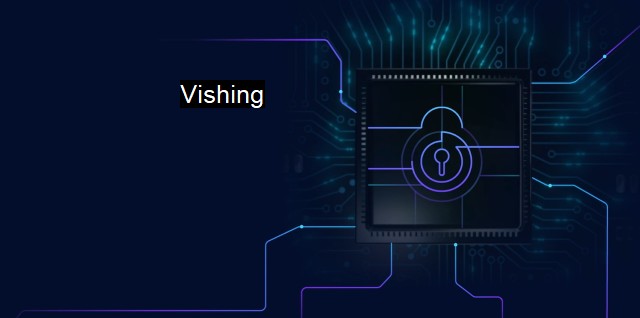What is Vishing?
Vishing: The Latest Cyber Threat Exploiting Our Trust in Phone Calls and How to Protect Yourself
Vishing, also known as voice phishing, is a form of social engineering where deceitful individuals use phone calls to trick unsuspecting victims into providing sensitive personal or financial information. The term itself is a portmanteau of ‘voice’ and ‘phishing’. it's a notable threat due to the ease with which such attacks can be conducted and the potential damage they can cause.By leveraging our inherent trust in the reliability of phone calls and the anonymity that they offer, cybercriminals weaponise the telephone network making vishing a popular and highly-effective technique. Often, vishing attacks SOUND authentic as they may contain specific personal details about the victim. This information may be obtained from earlier successful phishing attacks or purchased from third-party sources.
In most vishing attacks, the fraudster impersonates a legitimate company or organization. The attacker contacts the victim pretending to be a bank representative, tech support specialist, government official, or similar authoritative figure. They typically trick their target into divulging critical information by instilling fear, offering assistance, or promising rewards.
Threat actors are adopting more sophisticated tactics in their vishing attacks. They often use caller-ID spoofing to disguise their phone numbers with a trusted number, making victims even more susceptible to fall for their scam. Autodialers are utilized to contact victims automatically, after which pre-recorded messages instruct the victims to enter their banking details over the phone.
Within cybersecurity and antivirus context, vishing is especially worrying as it primarily targets the less tech-savvy population, who may not even realize they've been scammed. The stolen data is evidently valuable, often leading to unauthorized financial transactions or fraudulent manipulations of personal accounts. It is also used to facilitate other nefarious acts of cybercrime, such as identity theft, spear phishing, and data breaches.
Protection against vishing requires a combination of technological solutions and awareness. Antivirus software can help to alert users to potential phishing attacks, through which vishers may attempt to acquire users' contact details. Firewalls can restrict outgoing network traffic, possibly preventing sensitive data from leaving internal networks.
Technological solutions may not always catch vishing strategies before the damage is done. Education and awareness remain vital. People need to understand the various potential vishing tactics as well as the processes fraudsters employ to get the information they seek. Under no circumstance should sensitive information like passwords, PINs, or credit card numbers be relayed over phone calls, especially unsolicited ones.
Large-scale digital literacy drives conducted by governments and private organizations can prove beneficial in spreading vishing awareness and maintaining cybersecurity hygiene. In business environments, regular phishing simulations and training newsletter updates are helpful to learn about the latest vishing threat intelligence. Employees need to recognize the telltale signs of vishing scams and understand the correct actions to take.
Incorporating vishing into a broader cybersecurity policy and response plan is crucial. Companies need to communicate internally about the threats and reinforce policies to counteract them. Strategies such as two-factor authentication can help protect against unauthorized access to person-sensitive data if an adversary is successful in obtaining credentials.
Vishing is a profound and evolving privacy concern, highlighting the deep-seated need for thorough and comprehensive cybersecurity measures. Combating vishing calls for vigilant technological defenses, awareness of potential threats, and proper use of phone-based services. As the techniques the vishers follow get more advanced, the defenses also must evolve concurrently to protect vulnerable individuals, businesses, and the substantial everyday dealings that occur over the phone network.

Vishing FAQs
What is vishing?
Vishing is a type of cyber attack where fraudsters use phone calls, voicemails, or text messages to trick individuals into revealing their sensitive information, such as bank account details, PIN numbers, social security numbers, and personal identification information.How do attackers carry out vishing attacks?
Attackers carry out vishing attacks by making phone calls or sending text messages impersonating legitimate organizations or companies, such as banks, government agencies, or tech support services. They usually use social engineering tactics to gain the trust of the victim and extract sensitive information from them.How can I protect myself from vishing attacks?
To protect yourself from vishing attacks, you should be cautious of unsolicited phone calls, voicemails, or text messages. If you receive such communications, do not provide any sensitive information, and verify the authenticity of the caller. You should also install an antivirus software that can detect and block phishing scams and other types of malware.What should I do if I fall victim to a vishing attack?
If you fall victim to a vishing attack, you should immediately contact your bank, credit card company, or any other institution where you have disclosed your sensitive information. You should also report the incident to the law enforcement authorities and your antivirus vendor. In addition, you should change your passwords, monitor your accounts for any suspicious activities, and educate yourself about vishing scams to avoid falling prey to them in the future.Related Topics
Social engineering attacks Phishing Identity theft Two-factor authentication (2FA) Caller ID spoofing
| | A | | | B | | | C | | | D | | | E | | | F | | | G | | | H | | | I | | | J | | | K | | | L | | | M | |
| | N | | | O | | | P | | | Q | | | R | | | S | | | T | | | U | | | V | | | W | | | X | | | Y | | | Z | |
| | 1 | | | 2 | | | 3 | | | 4 | | | 7 | | | 8 | | |||||||